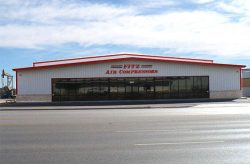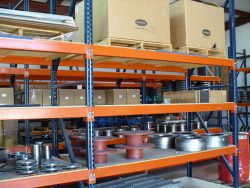When to Service Your Industrial Air Compressor
No one can afford to keep your compressor dysfunctional or underperforming for days. Did you know that a typical industrial air compressor has an efficiency of around 10-15%? From fabrication to manufacturing, your facility’s operations often require an industrial compressor’s exceptional performance and dependability.
When your compressor shows performance failure, it’s essential to address and fix the issue as soon as possible. But should you wait for your air compressor to fail before hiring professionals to service it? Of course not.
Don’t wait for a breakdown to disrupt your operations. Visit our Contact Us page now to schedule a consultation and ensure your compressors are in top shape!
So, when should you service your industrial air compressor? We gathered some of the most common signs to determine when you need to call for professionals to service your compressor before it’s too late. These experts can also recommend industrial air compressors for sale if your unit needs replacing.
When to Service an Industrial Air Compressor
Regular industrial air compressor service is essential for maintaining your unit’s optimal performance. Pay attention to warning signs such as decreased airflow, unusual noises, leaks, high operating temperature, increased energy consumption, and irregular cycling. These symptoms indicate potential issues that require professional attention to prevent costly downtime and ensure the longevity of your compressor.
Unusual high operating temperature
If you notice an increased compressor operating temperature, it strongly indicates something is amiss with your air compressor. It could mean that it’s fighting a constant battle against heat inside. Several factors affect this sudden rise in compressor temperature: lubricant conditions, maintenance program, and compressor coolers.
Some of the most common signs that your air compressor is overheating are:
- the compressor doesn’t turn on
- circuit breaker tripping
- oil-related issues
- accelerated wear
Take note that your air compressor’s operating temperature range is between 50-85 degrees Fahrenheit. Too much heat can cause damage and a complete shutdown to your compressor. Call the experts to avoid further damage if the high operating temperature happens continuously.
Irregular Cycling or Frequent Shutdowns
Irregular cycling and frequent shutdowns of an industrial air compressor suggest potential issues requiring immediate attention. Get industrial air compressor service as soon as you see this symptom. These occurrences may stem from pressure fluctuations due to leaks, faulty sensors, or control system malfunctions, causing the compressor to cycle more frequently.
Overheating can trigger shutdowns as a safety precaution against damage, often caused by blocked filters or inadequate ventilation. Such operational irregularities accelerate component wear, including motors, bearings, and valves. Prompt professional servicing is crucial to diagnose and address these issues, preventing costly downtime and extending the compressor’s lifespan.
Increased/strange noises
If you hear an unusual and high operating noise from your industrial air compressors, especially if it’s an older model, it’s high time to bring the professionals for some repair. But first, make sure to familiarize yourself with the operating noise. This way, you can investigate if there are any changes to the sounds, such as unexplained clicks, rattles, or rumbles.
Do you hear a clicking or ticking sound as soon as you turn on your compressor? It could point to an electrical component issue and lead to a complete shutdown. Before things get worse, call an expert as soon as possible.
If it’s a rattling noise, the issue could come from the condenser cabinet and indicate loose parts clattering around. It can also be an issue with the fan, but if the noise is unidentified, don’t wait before anything worse happens and contact an expert immediately.
Low pressure
The most common issue of a faulty compressor is low air pressure. In most cases, inadequate air pressure is due to reporting issues, wear and tear on internal or external parts, slipped belts, or a technical issue. Once a compressed air system cannot maintain the pressure needed, it can cause serious problems, including poor product quality, facility downtime, and reduced safety.
Pay attention to your compressed air system and expect it to supply sufficient airflow and pressure to support system performance. Otherwise, locate what’s causing the low-pressure issue and address it as soon as possible. Then, contact the experts to help you simplify the process and replace the necessary industrial parts and equipment.
Excess moisture
The excess liquid in your facility’s compressed air supply damages the quality, productivity, and reliability of your facility. An air compressor accumulates moisture when running, but its automatic drain system may be having an issue if it’s producing excess condensation. Liquid condensation is the natural byproduct of the compression process.
Check the air receive drains to see if they are working correctly. Is it a manual drain? Be sure to drain it daily. Otherwise, it may not be very accurate, and you may consider adding a dryer or filter to your system.
Keeping condensation at a minimum is crucial, but condensation problems arise as your air compressor wears down. Contact a service technician if you notice excessive condensation within your system before it causes more significant problems in the future.
Motor overload or tripped breakers
When your electrical system overloads, breakers trip or fuses blow out. As soon as this happens, your compressor cannot function until you reset the breaker or replace the fuse. When electrical-related issues happen, contact a professional to check the electrical circuit and other problems that might cause this.
Your air compressor is running smoothly and efficiently with the help of a high-capacity induction motor, but when it becomes faulty, it can trip the system’s circuit breaker. If this may be the problem, get it serviced as soon as possible to avoid further motor damage.
Recommended Service Schedule
Implementing a regular maintenance schedule is essential for ensuring the optimal performance of your industrial air compressor. Work with trusted professionals who know when to service an industrial air compressor. They can recommend a maintenance schedule that won’t disrupt your operations.
Daily, Weekly, and Monthly Checks
Your team can conduct daily visual inspections to check for the symptoms mentioned earlier. Weekly tasks should include checking and cleaning air filters, inspecting belts and hoses for wear, and draining moisture from the tank. Monthly tasks may involve inspecting electrical connections, lubricating moving parts, and recording performance metrics such as pressure levels and temperature.
Quarterly Maintenance
Quarterly maintenance tasks should focus on more in-depth inspections and adjustments to keep the compressor running smoothly. This may include checking and adjusting belt tension, inspecting and cleaning cooling fans and radiators, and testing safety mechanisms such as pressure relief valves.
Annual and Bi-Annual Comprehensive Servicing
Consider scheduling this comprehensive servicing during planned shutdowns or slow production periods to minimize disruption to operations. This process involves a thorough inspection of all components, including internal parts such as valves, pistons, and seals. Technicians will also replace worn-out components and perform necessary repairs.
Choosing a Service Provider
There are several crucial factors to consider when choosing a service provider that offers industrial air compressor service. Prioritize factors like reputation, reliability, and responsiveness. Assess their track record, customer feedback, and availability for emergency services to ensure they meet your needs effectively.
Qualifications and Certifications
Seek service providers with relevant qualifications and certifications in industrial compressor servicing. Certifications from bodies like the Compressed Air and Gas Institute (CAGI) or manufacturer-specific credentials demonstrate adherence to industry standards and expertise, ensuring competent maintenance and repair.
Experience and Expertise
Experience is essential in compressor servicing. Opt for providers with extensive experience handling various compressor types, brands, and models. A seasoned technician can accurately diagnose issues, propose solutions, and execute repairs swiftly, minimizing downtime and prolonging compressor lifespan. Entrusting your machine to experienced professionals guarantees reliable performance.
Dependable, Fast, and Friendly Service
Fitz Equipment is an industrial equipment and services company. We have been in service for over 50 years. So, if you’re wondering when to service your industrial air compressor, we are here for you!
We can handle all your industrial air compressor needs if you are looking for industrial air compressor units for sale, replacement parts and customized units.
Fitz Equipment is an authorized Gardner Denver distributor. So whether you’re looking for a new Gardner Denver air compressor or a rebuilt model, Fitz Equipment is the best place to find the one you need.
You can request a quote here, or for immediate assistance, call us at 888 220 3489.




